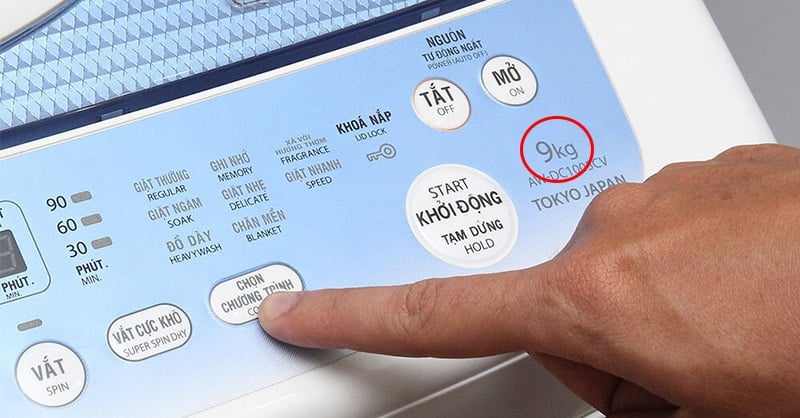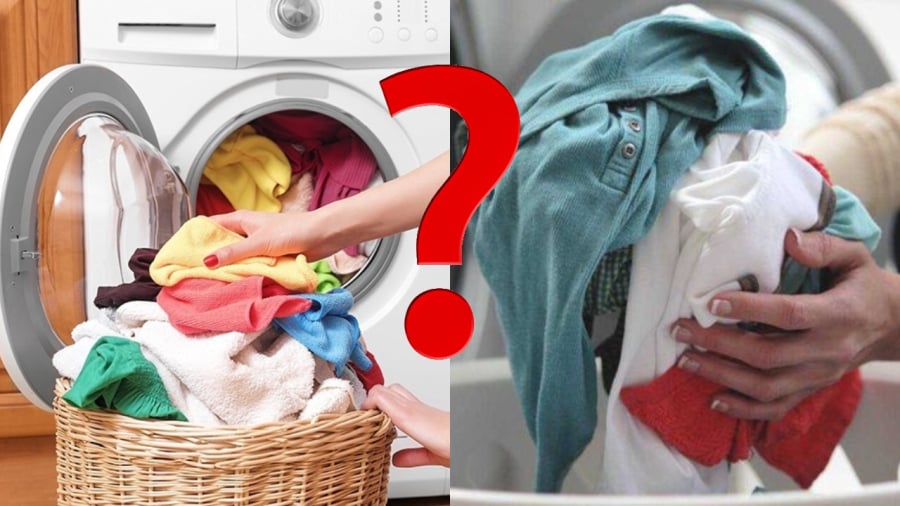When it comes to familiar electronic devices and home appliances, one cannot overlook the washing machine. Washing machines were invented to support humans in cleaning clothes, helping to save time and effort.
Using a washing machine is quite simple, mainly through the electronic control panel of the device. However, there is some basic information about washing machines that not everyone knows and understands the true meaning of. These are the numbers indicating weight, such as 7kg, 8kg, or 10kg.
Are these numbers referring to the weight of dry or wet clothes that can be processed in one wash? Most people, when asked, answer that it is for wet clothes. So, what is the correct answer?

The capacity of a washing machine is indicated in kilograms.
Do the weight indications on washing machines refer to dry or wet clothes?
The numbers 7kg, 10kg, etc., on washing machines indicate the maximum weight of dry clothes that can be put into the machine for each wash. This is different from dryers, where the capacity is calculated based on the weight of damp clothes.
If you wash too few clothes compared to the specified capacity, you will waste electricity and water, and if you wash too many, they may not be cleaned properly. Therefore, it is best to wash an amount that is about 70% – 80% of the machine’s capacity for optimal washing results.
For example, if your washing machine can handle 9kg of clothes, you should only put about 7 – 8kg of clothes in. Never exceed the maximum capacity of 9kg to avoid overloading the machine, which can lead to malfunction and ineffective washing. You can weigh or estimate the weight of the clothes according to the type of fabric and length to know the exact weight.
All washing machines will have a minimum water level. Even if we put in a small amount of clothes, the machine will pump enough water to start running. The larger the machine’s capacity, the higher the minimum water level. If you put in too few clothes, they may not be scrubbed properly during the washing process and may not come out clean.
In addition, when washing clothes, we need to consider not only the weight but also the size. Some types of fabric may expand significantly when wet, such as woolen clothes. Therefore, only a small amount should be put into the machine, as too much will hinder the normal operation of the washing machine.
In summary, remember that the weight indications on washing machines refer to dry clothes, and the amount of clothes put into the machine should not exceed 2/3 of the height of the washing tub. It is also important to not pack the clothes too tightly to achieve better washing results.
Some disadvantages of washing too much or too little
Overloading the machine (putting in more clothes than the manufacturer’s recommendation) can lead to the following harmful consequences:
– Improper distribution of items in the washing tub: This can cause strong vibrations during the spinning process, and the machine may even slow down or completely stop the spinning mode. In this case, you may have to manually move the clothes in the tub or remove the still-wet clothes.
– Impact on the motor: When the machine is overloaded, the motor has to work at high speed, causing it to overheat and reducing the lifespan of the washing machine.
– Damage to the washing tub: Cracks and leaks may occur. The heavy load will increase the wear and tear on the bearings, damage the shock absorbers, or break the drive belt.
– Ineffective washing: Stuffing too many clothes into the tub will result in uneven cleaning, leaving some clothes still dirty.
– Faster deterioration of clothes: Due to overloading, the friction between the clothes and between the clothes and the tub increases. This will cause the clothes to fade and lose their shape faster.

Is the 7kg, 12kg capacity of a washing machine for dry or wet clothes? 90% of people get it wrong.
If you put too few clothes into the machine, during the spinning cycle, the small amount of clothes may not be distributed evenly throughout the tub, increasing the possibility of vibrations, which is not good for the machine. Therefore, the amount of clothes in the tub should not be less than 20% of its volume.
What Does Your Washer’s 7kg and 12kg Capacity Actually Mean? Dry Clothes or Wet? 90% of People Get This Wrong.
The weight limit on your washing machine, whether it’s 7kg, 9kg, or 12kg, refers to the weight of dry clothing. This is an important distinction to make, as wet clothing can weigh significantly more than dry clothing, and overloading your machine can lead to reduced performance and even damage over time. Always refer to the dry weight of your laundry when checking the capacity of your machine.





































